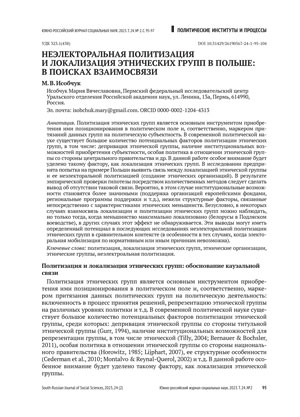Abstract
The politicization of ethnic communities serves as the pivotal mechanism for their placement within the political arena and serves as a defining factor in their pursuit of political agency status. Modern political science identifies several potential factors that drive the politicization of ethnic groups, such as ethnic group deprivation, institutional opportunities for gaining agency status, specific policies of the central government towards ethnic groups, and others. This paper focuses on one such factor — localization of ethnic groups. The study seeks to reveal the relationship between localization of an ethnic group and its non- electoral politicization (establishing ethnic organizations) by using Poland as an example. Empirical verification of the hypothesis by means of quantitative test methods led to the conclusion that no such connection existed. Probably, in this case, institutional opportunities such as the support of organizations through European funds and regional support programs are more significant than the structural factors that directly relate to the characteristics of ethnic minorities. Certainly, in some cases, a correlation can be observed between the localization and politicization of ethnic groups. However, this effect is only evident when the minority group is maximally localized, such as the Belarusians in the Podlaskie Voivodeship. In other cases, this correlation is not detected. These results have the potential to contribute to future research on the non-electoral politicization of ethnic groups in a comparative context, particularly in situations where electoral mobilization is not possible due to normative or other constraints.
Keywords
References
Брубейкер, Р. (2012). Этничность без групп. М.: Изд. дом Высшей школы экономики.
Исобчук, М.В. (2019). Место имеет значение: влияние локализации этнических групп на их политизацию в странах Центральной Восточной Европы. Вестник Пермского университета. Серия: Политология, 13(3), 78–87.
Минаева, Э.Ю., Панов, П.В. (2017). Локализация этнических групп и конструирование политико-административных границ: условия сегментации политического пространства. В П.В. Панов Балансируя притязания: этнические региональные автономии, целостность государства и права этнических меньшинств. М: Политическая энциклопедия.
Anderson, B. (1983). Imagined Communities. Reflections on the Origin and Spread of Nationalism. Verso.
Asal, V., Schulzke M. Pate, A. (2014). Why do Some Organizations Kill while Others do not: An Examination of Middle Eastern Organizations. Foreign Policy Analysis, 13(4), 279–301. DOI: 10.1111/fpa.12080
Barth, F. (1998). Ethnic Groups and Boundaries: The Social Organization of Culture Difference. Waveland Press.
Bernauer, J., Bochsler, D. (2011). Electoral Entry and Success of Ethnic Minority Parties in Central and Eastern Europe: A Hierarchical Selection Model. Electoral Studies, 30(4), 738–755. DOI: 10.1016/j.electstud.2011.07.001
Cedermann, L. et al. (2010). Why Do Ethnic Groups Rebel? New Data and Analysis. World Politics, 62(1), 87–119. DOI: 10.1017/S0043887109990219
Cunningham, K. (2014). Inside the Politics of self-determination. Oxford University Press.
Gurr, T.R. (1994). Ethnic Conflict in World Politics. Westview Press.
Horowitz, D. (1985). Ethnic Groups in conflict. London: University California Press.
Lijphart A. (2007). Thinking about Democracy: Power Sharing and Majority Rule in Theory and Practice. N.Y: Routledge.
Montalvo, J., Reynal-Querol, M. (2002). Why Ethnic Fractionalization? Polarization, Ethnic Conflict and Growth. Barcelona: Universitat Pompeu Fabra.
Tilly, C. (2004). Social Movements, 1768–2004. Boulder: Paradigm Publishers.
Toft, M. (2003). The Geography of Ethnic Violence: Identity, Interests, and the Indivisibility of Territory. Princeton.


